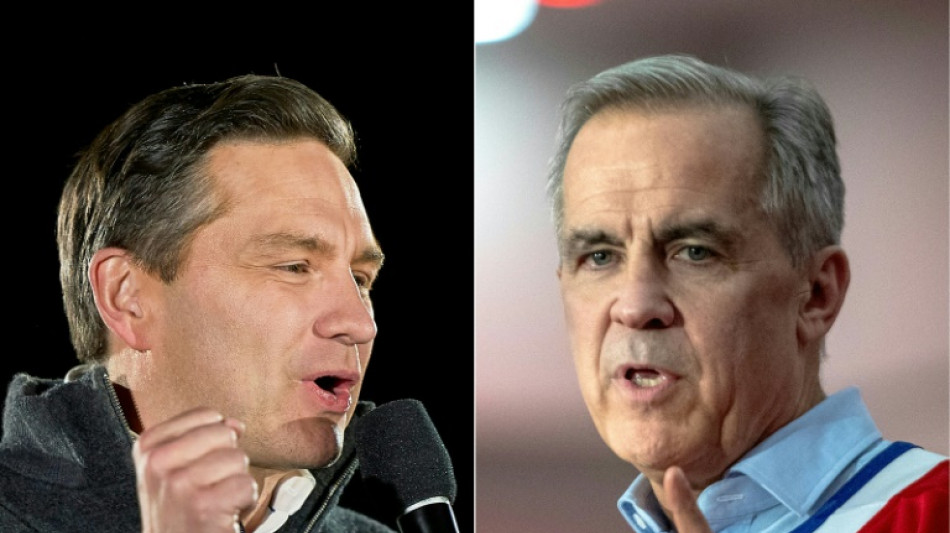
| RBGPF | -4.22% | 60.88 | $ | |
| JRI | 0.99% | 12.868 | $ | |
| GSK | 1.98% | 38.185 | $ | |
| BCC | -0.51% | 95.03 | $ | |
| SCS | -0.66% | 9.825 | $ | |
| BCE | 0.6% | 21.78 | $ | |
| NGG | 0.85% | 72.66 | $ | |
| RELX | -0.36% | 53.36 | $ | |
| RIO | 0.43% | 60.82 | $ | |
| RYCEF | 0.29% | 10.18 | $ | |
| CMSC | -0.27% | 22.27 | $ | |
| AZN | 0.24% | 69.735 | $ | |
| CMSD | 0.12% | 22.487 | $ | |
| VOD | 2.35% | 9.575 | $ | |
| BTI | 0.54% | 42.28 | $ | |
| BP | -0.1% | 29.16 | $ |

Canada votes as Trump renews US takeover push
Canadians across six time zones were voting Monday to choose a new leader to confront Donald Trump's trade war and annexation threats, which the US president renewed in a forceful election day message.
The Liberal Party, led by new Prime Minister Mark Carney, looked set to lose to the Conservatives' Pierre Poilievre until Trump's attacks on Canada sparked a sudden reversal in poll forecasts.
Trump inserted himself into Canadian politics on election day with a social media post saying Canada would face "ZERO TARIFFS" if it "becomes the cherished 51st state."
"No more artificially drawn line from many years ago," he said.
Trump's prominence in the race has hurt Poilievre's chances of becoming prime minister and the Tory leader hit back before he voted on Monday.
"President Trump, stay out of our election," he posted on X.
"Canada will always be proud, sovereign and independent and we will NEVER be the 51st state."
Carney, 60, has never held elected office and only replaced Justin Trudeau as prime minister last month. He had a lucrative career as an investment banker before serving as the central bank governor in both Canada and Britain.
Carney has argued his global financial experience has prepared him to guide Canada's response to Trump.
He has also promised to expand Canada's economic opportunities abroad to cut reliance on the United States, a country Carney says "we can no longer trust."
"We don't need chaos, we need calm. We don't need anger, we need an adult," Carney said in the campaign's closing days.
Poilievre, a 45-year-old career politician, has tried to keep the focus on domestic concerns that made Trudeau deeply unpopular toward the end of his decade in power, especially soaring living costs.
The Tory leader has argued Carney would continue "the lost Liberal decade," and that only the Conservatives will act against crime, housing shortages and other non-Trump issues Canadians rank as priorities.
"You cannot handle another four years of this," he said over the weekend.
- 'Settle down' -
Final polls indicate a tight race but put Carney as the favorite.
Surveys have also consistently shown voters view the ex-central banker as the best candidate to deal with Trump.
Montreal resident Hamza Fahri, who plans to vote after work, described the election as "unique."
"I wanted to vote for change in Canada. I wanted the Liberals to go, but in the end, I'll vote for Carney because he is a strong, serious man and that's what the country needs to face Trump," the 28-year-old engineer told AFP.
But Kelsey Leschasin, who lives in the Conservative-leaning central province of Saskatchewan, said her priority was "change."
"I don't agree with the Liberal government and how they're running our country," she told AFP in Montreal, where she was visiting for a conference.
In Ottawa, Caroline Jose voiced concern Trump's threats had put voters into "kind of a panic," and that critical issues like income inequality had not been discussed.
"I wish we could have things settle down and (people) could vote with the mind and not with their gut," the 46-year-old said.
- Historic turnaround? -
If the Liberals win, it would mark one of the most dramatic turnarounds in Canadian political history.
On January 6, the day Trudeau announced he would resign, the Conservatives led the Liberals by more than 20 points in most polls.
But Carney replacing Trudeau combined with nationwide unease about Trump transformed the race.
Public broadcaster CBC's poll aggregator final update late Sunday put the Liberals' national support at 42.8 percent, with the Conservatives at 39.2 percent.
As with US elections, national polling numbers may not predict a result.
The performance of two smaller parties -- the left-wing New Democratic Party and the separatist Bloc Quebecois -- could be decisive as strong showings by both parties in past votes have curbed Liberal seat tallies.
Nearly 29 million of Canada's 41 million people are eligible to vote, in the massive G7 country. A record 7.3 million people cast advanced ballots.
Canadians will elect 343 members of parliament, meaning 172 seats are needed for a majority. The Liberals won a majority in 2015 but have governed with a minority since 2019.
R.Ryan--NG



